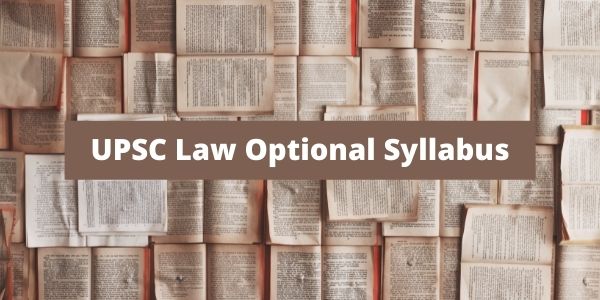Understanding the optional subjects is essential for the UPSC exam. In our earlier article, we have discussed various optional subjects syllabus and the books. Further, in this article, we will discuss the UPSC Law Optional Syllabus and get the details of the optional law syllabus for the UPSC exam. Let’s Begin.

Introduction
As we all know, selecting the optional subject for the UPSC exam plays a vital role. As it will impact the final scores, you have to be careful while choosing the subject. First, ensure that you have gone through the complete syllabus of the subject. Further, one needs to know their interests and skills, don’t choose because everyone else is choosing that subject. Instead, learn your skills and choose the optional subject. The UPSC exam has the longest syllabus, and you must cover all the concepts. The UPSC exam has three stages: prelims, the main paper, and the interview round. Two papers are objective type in the prelims, and in the main paper, nine papers are descriptive type. Later, those who clear the main exam are allowed to give the interview round.
Further, the Law optional subject has gained popularity among the UPSC. This subject enjoys a success rate of 15 – 20% in the UPSC exam. Therefore, it is not necessary to have the background knowledge to take up this as an optional subject with the right plan and direction. Besides, if you want to know about the IAS exam, history, and other details, you can go through the official website. Click Here.
Law Subject as optional
Now let us understand the pros and cons of taking this subject as optional. It is important for one to know the pros and cons of the subject before choosing the subject.
Pros
- In the first place, this optional subject overlaps with General Studies
- Further, it also overlaps with the essay paper.
- Besides, it has a short syllabus, it will be easy to complete the syllabus.
- Then, it has a good success rate when compared with other optional subjects.
- Lastly, this subject is non-technical in nature, so one can easily understand and prepare for the exam.
Cons
- This subject is not scoring as the science optionals. But, with all efforts you can score up to 150 easily.
- You will not find many good test series, when compared with other optional subjects.

UPSC Law Optional Syllabus
Further, below we have added the Law optional syllabus for Paper 1
- Relationship between fundamental rights, fundamental duties, and directive principles.
- Supreme Court and High Courts – 1. Appointments and transfer. 2. Powers, functions and jurisdiction.
- Centre, States and local bodies: (1) Distribution of legislative powers between the Union and the States. (2) Local bodies. (3) Administrative relationship among Union, State and Local Bodies. (4) Eminent domain – State property – common property – community property.
- Services under the Union and the States: (1) Recruitment and conditions of services; Constitutional safeguards; Administrative tribunals. (2) Union Public Service Commission and State Public Service Commissions – Power and functions (3) Election Commission : Power and functions.
- Emergency provisions.
- Delegated legislation and its constitutionality.
- Separation of powers and constitutional governance.
- Nature and definition of international law.
- Relationship between international law and municipal law.
- State recognition and state succession.
- Fundamental principles of international humanitarian law : International conventions and contemporary developments.
- Legality of the use of nuclear weapons and ban on testing of nuclear weapons; Nuclear : non proliferation treaty, CTBT.
- Further, the International terrorism, state sponsored terrorism, hijacking, international criminal court.
- New international economic order and monetary law – WTO, TRIPS, GATT, IMF, World Bank.
- Lastly, Protection and improvement of the human environment: International efforts.
Continued
Check out the Law optional syllabus for paper 2
- General principles of criminal liability – Mens rea and actus reus, mens rea in statutory offences.
- Various of punishment and emerging trends as to ban of capital punishment.
- Offences against the State.
- Offences against public tranquility.
- Preparation and criminal attempt.
- Offences against women.
- Defamation.
- General exceptions.
- Joint and constructive liability.
- Abetment.
- Prevention of Corruption Act, 1988.
- Criminal conspiracy.
Law of Contracts and Mercantile Law
- Nature and formation of contract/Econtract.
- Factors vitiating free consent.
- Performance and discharge of contracts.
- Contract of indemnity, guarantee and insurance.
- Contract of agency.
- Sale of goods and hire purchase.
- Negotiable Instruments Act, 1881.
- Arbitration and Conciliation Act, 1996.
- Standard form contracts.

Besides, click on the below link for the complete syllabus, and you can download it.
Book List
Further, look into some of the books to cover the optional law syllabus for the UPSC exam. To cover the complete syllabus it is important for one to study from the best books.
- The Constitution of India (Bare Act) – PM Bakshi
- Constitution of India- V. N Shukla
- Jurisprudence – P.K. Tripathi and Dias
- Criminal Law – P. S. Atchuthen Pillai.
- Indian Penal Code-Ratanlal and Dhirajlal
- Principles of Mercantile Law- Avtar Singh
Essential Tips for the Exam
Following up a good exam strategy is essential for any exam, without the proper plan it will become difficult for one to score well in the exam. So, we will give you some tips that you can use in the exam.
- Know the Syllabus – It is the most important thing in any exam. So, understand the complete syllabus of the paper and also understand the paper pattern. Then, only study well for the exam.
- Question Papers – Referring to the previous year’s papers will help you in many ways. So, try to look into them and understand the questions, topics, and marks. Try to solve as many question papers as possible.
- Revision – If you don’t revise properly, it will be difficult to remember things easily. So, we suggest for all to revise and also allot some time along with the other subjects.
- Mock tests – To get the feel of the final year paper, one must give mock tests. Many platforms provide you with mock tests; try to give them. It will help you to understand your skills and improvement areas.
- Time Table – one must make the best use of the time available. Try to give time for all the subjects, including for the revision.
- Answer Writing – Further, many tend to ignore this. If you just study without practicing answering, it will be difficult to cover everything in the final papers. So, try to write the answer with limited words and within time. You can also refer to the answers written by the toppers and compare your answers with them. Further, you can click here to know the complete details of the UPSC exam and other details related to the exam.
Conclusion – UPSC Law Optional Syllabus
In summary, this article will provide you the complete information on the UPSC Law Optional Syllabus. Further, understand the pros and cons of this subject. One must carefully choose the optional topic by knowing their skills and interest as it will impact the final scores of the exam. For this, you can refer to the previous year’s papers and textbooks to know the exam syllabus and the questions. With the right plan and direction, one can clear the UPSC exam. It is normal to get tensed and worry about the results. Instead, one can focus on the studies and stop worrying about the results. However, if you work hard on your dreams, you will achieve your goals. So, it is all about your hard work and dedication towards your goals.
Further, it becomes essential to check with the official website to know about the exam’s latest news, like dates, results, and other related details. Therefore, click here to go through the official website. As we all know it isn’t easy to cover the syllabus and many times you feel like giving up. But, don’t. Later, you choose to join the classes, and it will help you in many ways. However, you can self-study. It depends on one person to the other.

FAQs – UPSC Law Optional Syllabus
Lastly, look into a few FAQs for more details.
It is one of the optional subjects, the success rate of scoring well in the exam is high.
Yes, it is one of the toughest exams present in India, as it has a vast syllabus.
180 IAS Officers are selected Every Year.
Taking coaching classes depends on the students. Either you can take or self-study. But, you have to complete the entire syllabus and work hard to clear the exam.
Editor’s Note | UPSC Law Optional Syllabus
In brief, know the complete details of the UPSC Law Optional Syllabus and why one must choose this subject as their optional subject. Besides, we have also added some of the book details for the exam purpose. It can be any exam, and one must always know the syllabus and the paper pattern. Therefore, it will make your rest work easy. Further, if you plan to take this subject as optional, we have added the complete details of the syllabus and the book information. So, don’t forget to make important points while reading the article. We have provided you with some tips that will also help you with the exam. From the article, know about the UPSC Law Optional Syllabus. Get complete details on the law optional syllabus for UPSC and some tips. We wish you good luck with the exam, prepare well for the exam.






